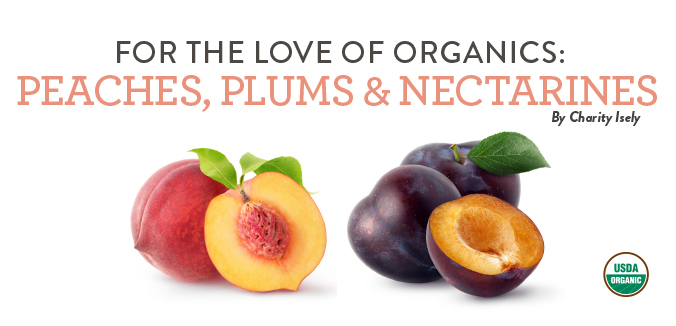


Sign-up for {N}power to get exclusive discounts, newsletters, members-only features, and more!
 Denver - Design District - Alameda and Broadway
Denver - Design District - Alameda and Broadway
368 S Broadway
Denver, CO 80209
United States
 Preferred Store:
Select a Store
Preferred Store:
Select a Store

They're the juiciest accessory of the summer—a must-have for every lover of good health and great flavor! Peaches, plums, nectarines… oh the deliciousness you can entertain with a summer afternoon and a bowl of sweet stone fruit.

Grill them, add them to a salad, and eat them whole straight out of the bowl. Take a bite out of these reasons why you should:
Sweet, tangy, melt-in-your-mouth flavor, these luscious summery treats have all that, and they are even better when you choose organic because organically grown peaches, plums, and nectarines have more of the antioxidants that make them extra good for you. A study comparing thirteen Japanese plum cultivars grown in conventional and organic systems found that organic production resulted in “significantly higher” amounts of anthocyanins and polyphenols as well as greater antioxidant capacity. Synthetic herbicides have varying effects that reduce the production of these beneficial phytochemicals.5 It’s not surprising, then, that the conclusion of this study is consistent with other research showing that in general, organic produce contains higher concentrations of health-supporting antioxidants.6
Unfortunately, there are some not-so-sweet facts about summer’s juiciest fruits. Nectarines and peaches have made the Environmental Working Group’s Dirty Dozen list of produce with the most pesticide residue for the last five years, and 2020 is no different.7 8 9 10 11 This year they are number four and number seven, respectively.12 Although plums didn’t make the Dirty Dozen, the database whatsonmyfood.org, which tracks pesticide residue based on USDA reports, shows an unappetizing trend for conventional imported plums. Just over ninety-three percent of samples tested had traces of the fungicide Iprodione, a known carcinogen and suspected hormone disruptor. Even worse, the maximum amount found was above the chronic toxicity threshold for children.13
As we savor the carefree, summertime flavors of stone fruit, let's also keep in mind the inter-connectedness between human health, the health of the planet, and social justice. We can't ignore the effects of industrialized agriculture, which is wreaking havoc on the environment while, at the same time, chronic diseases are on the rise. As reported by the Rodale Institute in their recently released paper, The Power of the Plate, "agriculture and factory farming are top contributors to global emissions and ambient air pollution.” According to the World Health Organization, ambient air pollution is a significant contributor to respiratory-related deaths, from lung cancer to respiratory infection, with communities of color bearing the heaviest burden. Environmental justice is intertwined with social justice, so as you indulge in summer’s sweet bounty, choose food that has been grown in a way that protects the environment and everyone’s health.
People are fed by the food industry, which pays no attention to health, and are treated by the health industry, which pays no attention to food.
- Wendell Berry



Sign-up for {N}power to get exclusive discounts, newsletters, members-only features, and more!
